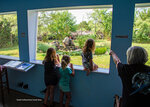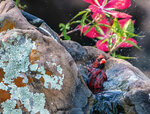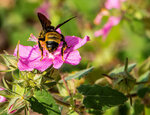


The Acton Nature Center is an excellent spot for those wanting to enjoy hiking, bird watching, a butterfly garden, and more in Hood County.
Wednesday morning proved to be a perfect time for Charlotte, Abigail, and Hannah Schumann to accompany their grandmother Lee Ann Cunningham on their first visit to another of Hood County’s hidden gems.
“What’s that over there?” Hannah, 4, asked, and before her grandmother can answer, both her older sisters pipe up with “That’s a birdhouse.”
Not everyone has “big-sister” knowledge about the birds in the local area, but it’s easy to find out if you visit the center on the first Saturday of each month from 7-10 a.m.
On those Saturdays, a “walkabout” guided bird-watching tour is conducted by Rio Brazos Master Naturalists Dr. Billy Teels and Dave Moore.
Both men volunteer their time at the center, and conducting the monthly tour is part of their duties. Teels’ ear is so tuned into the local bird population that he can tell you what is around the corner by a feathered creature’s call.
The Acton Nature Center stands on property that once belonged to the federal government and was a radio tower site for aircraft. Two decades ago, communications improvements and a different tower location near Glen Rose led to the government “gifting” the property with specific stipulations that it would be used in a way to benefit the public.
The public benefited, and so have native plants and wildlife that live inside the area. Teels and Moore’s efforts are geared toward returning the site to its entirely natural state that includes tall native grass.
Hidden in the trees, brush, and grass is an abundant wildlife population and several trails crisscross the area. Hikers can make their way past birdhouses built on extra long poles, home to purple martins.
Near the middle of the property is the center’s education building which plays home to the First Friday Home School Program.
While entrance to the center is free, the Master-Naturalist-led homeschool program is fee-based and provides students a hands-on adventure into science, art and nature.
Each month offers a new topic, and a semester-long group project will have students building a “pollinator hotel” to display the nesting methods of critically essential insect populations.
The class size is limited to 20 students (with an accompanying parent) and the cost of $50 per child with $100 max per family. Students are asked to commit to the entire course, and scholarships are available. The class content is geared toward students from age 8 through high school.
Students will be introduced to new content each month and will study bumblebees, the journey of the Monarch butterfly, composting, mapping and orienteering, birding, faces of the moon and more.
The Schumann sisters had little interest in studying and wanted to “see” something and the center’s bird blind was the perfect opportunity.
The small outbuilding is chock full of birding information and offers a unique peek and perch to watch birds come into a quiet garden and water fountain area.
There are abundant feeders and Wednesday, and they were loaded with male and female cardinals.
“Look at that one,” Hannah said. “She’s taking a bath.”
“That’s a ‘he’,” pipes up one of her sisters as Grandma quietly explains how male birds are more brightly colored than females. The reason is that males use their plumage to attract mates, and females need camouflage when they are nesting.
As the girls made their way into the butterfly garden, they were warned to watch out for the bees that were all busy gathering nectar.
As the bees made their way from one colorful flower to another, they were coating themselves in the pollen and bearing testament to the work of teachers and students who work on their habitat.
Geocaching is another popular activity encouraged by the Acton Nature Center, and it also promotes the Lights Out Texas program to protect migrating birds.
Every spring and fall, nearly two billion birds – between a quarter and a third of all birds migrating at night through the United States – travel through Texas in one of the planet’s great wildlife spectacles.
Light pollution is underrecognized threat to birds. Due to urban sprawl, tall buildings, and highly reflective glass windows, the lights emanating from cities at night disorients the birds, leaving them confused and vulnerable to collisions with buildings and threats on the ground.
Located at 6900 Smokey Hill Ct off the Fall Creek Highway, the Acton Nature Center is open seven days a week from dawn until dusk, and it is always free.
To learn more, log online at actonnaturecenter.org
Russell@hcnews.com | 817-573-7066 Ext 231